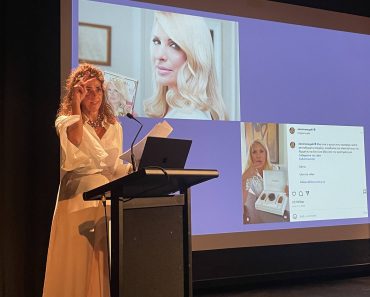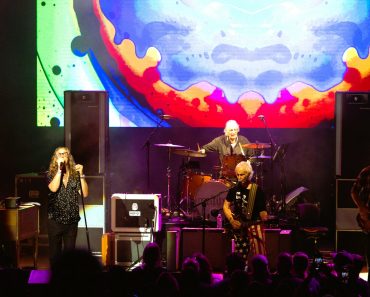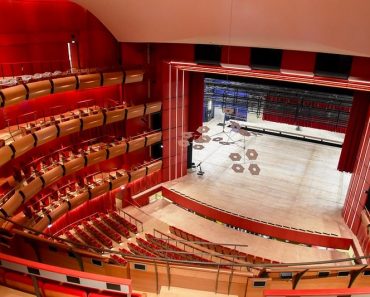As a documentation of the musical tradition, the concert by pianist and composer Ilir Bajri and vocalist and arranger Agona Shporta, on Thursday evening within the framework of the international music festival “ReMusica”, was witnessed. With the title “Beyond Tradition”, the duo combines styles and genres in folk music. And it has also been in artistic dialogue with the cultures and folklore of other countries in combination with what the ensemble “Zefiro Torna” cultivates.
The concerts within the program of the “ReMusica” festival are separate chapters each time. Double concerts were organized in the last edition, but this year they seem necessary. In this way, the audience is shown the contrasts between musical styles and genres. They also fit the theme of this year’s edition – “Contrasts”.
In the first part of the concert on Thursday evening, the audience had the opportunity to get acquainted not only with the precious heritage of Albanian music, but also with the work of Bajri e Shportës in researching, cultivating and arranging this work, hidden in various Albanian territories. The program included arrangements of songs from the Kosovo and Albanian regions from their albums “Hape portën” from 2024 and “Introspective” from 2022.
And they have called the concert “Beyond Tradition”, as it was. The voices bend not beyond the original lyrics, but taking on shades of jazz music. And the sounds of the piano break away from the traditional rhythm towards this same genre, always rediscovering the melodic line of traditional music.
And each song is a story in itself. The people have told stories through songs and the duo’s first narrative in their concert was the song “Osman Taka”. With it, the portrait of the 19th century artist, the dancer Osman Taka, is completed in a way. History says that as a rebel he fought the Ottoman Empire, which was occupying Albania. When he was sentenced to death, his last wish was to dance, before being killed in Ioannina.
The song “Moj Hatixhe” has come out more muted than the popular version. Now it comes adapting to the context, as a kind of opposition to folklore, and the revolt also comes from Ilir Bajri’s playing on the piano, pushing Shporta towards higher vocal tones.
The prominent jazz pianist and composer on the music scene said that the program was adapted to the festival’s theme.
“Agona also has that concept, that is, processing songs, researching tradition. There are many beautiful things left that have been forgotten, or worse, not heard at all. I am also interested in that music, a little older and the question of what is traditional, Albanian, is it unique, is it similar to others. These are the experiments we usually do with music. At this festival, since it was also the theme, it was quite appropriate to play it,” he said.
With these songs, the duo has brought the harmony of traditional songs very beautifully. With all the colors of the voice and the rhythms of the piano. Bajri, as a master of jazz music, has amazingly combined the improvisational genre with musical parts of traditional songs.
The song “Djalo i ri” suited Agona Shporta’s vocals. The piano with improvisational sounds breaks away from the rhythms of the song, echoing and giving the song new dimensions. The melodic line with Shporta’s voice brings it back to the starting point.
The duo Bajri and Shporta have also brought the songs “Zara” and “Asaman moj zojë mirane”.
The second part was a kind of parallel or comparison with their concert. The “Zafiro Torna” ensemble has brought songs from the baroque to the modern era. From Portuguese and Greek songs, it has returned to Albanian, in collaboration with Agona Shporta. She joined the ensemble as a result of the artistic residency organized by the festival. “Unity in Diversity” is the title of the concert and also of the project of the Belgian Presidency of the European Union, as an artistic dialogue with collaborations with different countries, and now also in Kosovo.
Virtuoso mandolinist Alon Sariel, lute player Jurgen de Bruyn, Christos Barbas with a kind of fiddle, lute and even his vocals, as well as vocalists Elly Aerden and Agona Shporta have brought a repertoire that represents different musical cultures.
They started this musical journey with “Gloria: Et in terra pax hominibus” which sounded romantic and oriental. The lutes are in a harmonious and beautiful dialogue. They then performed “Cançao de Embalar”, “La Suava melodia”, “Quante stelle nel cielo” and “Mera Merose”.
In the instrumental piece titled “Perasma”, the wind instrument played by Christos Barbas has become a kind of voice for the song without a singer.
Agona Shporta has joined the ensemble and together they have performed the songs “Open Your Eyes”, “Get Up Rexho” and “Durme Durme”.
The musical instruments of the Baroque period in this case take on the context of traditional Albanian music. With singer Elly Aerden, the voices are combined quite well.
The ensemble “Zefiro Torna” performed the songs “To Yasemi” and “La comida la manyana” in the last part. And at the very end, joined by pianist Ilir Bajri – as well as two young women who presented musical instruments made from recycled materials as a product of one of the workshops organized by the festival – they performed the song “Hape portën”.
Prominent mandolinist Alon Sariel said that this was their first time in Kosovo. He said that the project was about meeting new people in new places and creating new arrangements.
“It’s to inspire each other and to influence each other, coming together in a program that was established days ago. This time there were many new things, like the Kosovo song and the Albanian language, which we haven’t done before and of course it was very exciting. I think it was a mutual inspiration, especially in one piece, ‘Durme, durme’, where it includes the traditions of our two countries and it was inspiring for all of us,” he said.
He noted that their program mainly included folklore from different countries.
“There was mostly folklore music. It was very mixed, the music comes from many different countries and eras. Even though our instruments are very old, we are not limited to early music, but we also play contemporary music and modern arrangements,” he said further.
For thirty years, the ensemble of what they call transhistorical music, “Zefiro Torna” has been on an epic journey through time and sound. What began as a search for forgotten voices from the Middle Ages, Renaissance and Baroque periods has grown into a fascinating interplay between the past and the future – a “musical alchemy in which tradition and innovation merge into an experience beyond clear definition,” as it is written.
The festival director, composer Donika Rudi, said that the fourth musical evening of the festival was a beautiful journey through different cultures.
“We are very happy that this year we had resident artists, this wonderful ensemble. Alon Sariel, a world name, very present on the international scene. Jurgen, Elly and the collaboration we had with Agona was fantastic. A very beautiful combination, not only of music, cultures, the diversity that the ensemble represents, but also in the overall sound of the ensemble with Agona, it has worked very well. So, an extremely spontaneous and very natural collaboration”, said Rudi.
On Wednesday, the ensemble held another concert at the “Autostrada Biennale” in Prizren as part of what the festival calls pocket concerts, conceived for the first time this year as part of the 24th edition.
The fourth musical evening of the “ReMusica” festival has been a kind of source of inspiration that goes towards new horizons, where the tradition of Albanian music is alongside the cultures of other countries.






